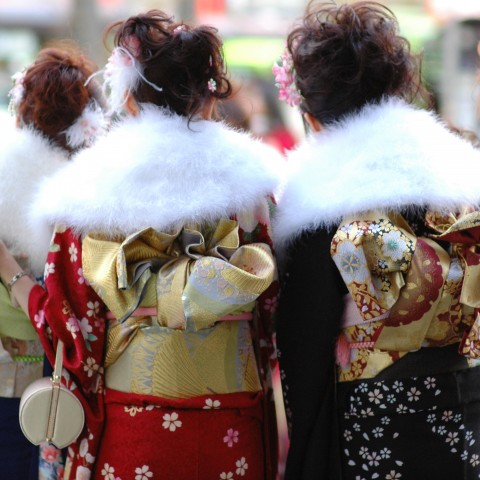Seijin No Hi: Celebrate Japanese Coming of Age Day in Japan:
Learning about the different holidays in Japan is a great step in better understanding Japan's culture. This is because Japanese holidays and traditions offer both insight into the country's past and values, as well as opportunities to learn the language itself more efficiently. (Because context can mean everything!)
In particular, Coming of Age Day in Japan holds great value to the country's youth and elderly alike. This is a day to celebrate all of those Japanese youth who have turned 20 years old, Japan's legal age of adulthood.
In addition to celebrating this momentous occasion in every Japanese adult's life, this day is also designed to encourage them to be the best adults they can be.
Despite the fact that what was once one of the most popular Japanese holidays is losing momentum, many people still hold to this holiday's traditions in Japan.
Learn more about this monumental day in the lives of young Japanese adults, including vocabulary and information about the Coming of Age Ceremony in Japan, with JapanesePod101.com.
1. Why Should You Know About Coming of Age Day?
Coming of Age Day in Japan is an exciting day for the country's youth, and is celebrated throughout Japan. This day is a reflection of Japan's culture in that it promotes the wellbeing and success of those who have officially become adults.
The passage from childhood to adulthood is important in Japanese culture (as it is around the world!), and in Japan this happens at the age of 20. As one of the most significant public holidays in Japan, there are some interesting holiday traditions in Japan for recognizing it.
Learn more about Japanese Coming of Age Day and its significance to the Japanese people!
2. What is Coming of Age Day in Japan?
On Japanese Coming of Age Day (or Seijin no hi), Japan celebrates its youth who have turned 20 years old-the age which signifies official adulthood. And this is no minor celebration; it's celebrated openly across the country, and is one of the most popular Japanese holidays.
This day is marked by the Coming of Age Ceremony, during which town officials around Japan hold celebrations for these new adults to welcome them into adulthood.
3. When is it?
Japanese Coming of Age Day takes place on the second Monday of January each year. For your convenience, here's a quick list of the date of this holiday for the next ten years:
- 2019: January 14
- 2020: January 13
- 2021: January 11
- 2022: January 10
- 2023: January 9
- 2024: January 8
- 2025: January 13
- 2026: January 12
- 2027: January 11
- 2028: January 10
4. How is it Celebrated?
1- Coming of Age Ceremony
On this day, the most important celebration is a Coming of Age Ceremony; one of these ceremonies takes place in various regions of Japan. All those who've turned 20 years old attend and are granted congratulations by town officials, as well as given a souvenir to remember the event by.
These ceremonies also serve as an opportunity for the new Japanese adults to step up and show their maturity. It's common for there to be a "representative" participant at these ceremonies, who gives a speech on behalf of each new Japanese adult. Oftentimes, these speeches contain promises of growing to become good and successful people, as well as hope for the future.
Another special feature of the Coming of Age Ceremony is that participants from the previous year are also welcomed to attend. This not only allows the new adults to see their older friends and acquaintances; it also gives the older visitors the opportunity to cheer on their younger friends and reflect on their own Coming of Age Ceremony the year before.
2- Dress
It's common for the young people to dress up in nice traditional clothing, particularly the young women who wear a 振袖 (ふりそで) or "furisode," which is a special type of kimono. Men tend to opt for a suit and tie themselves, but on occasion will choose to wear a kimono with a 袴 (はか)
or "hakama," which are like loose-fitting trousers.3- Food and Fun
After the ceremonies are over, some of the young people choose to spend time partying with their close friends and family. Oftentimes, they go out drinking and enjoy eating 赤飯 (せきはん),
or "sekihan," which is a popular dish with rice and red beans often associated with holidays and special events.Despite recent changes in the holiday (namely: lesser participation among youths and lowered age of maturity to 18 soon to take effect), it remains a significant day in the lives of many new adults and their families.
5. Must-Know Vocab for Coming of Age Day
Now that you've learned more about Japanese Coming of Age Day, let's delve into some vocabulary you should know to celebrate this Japanese holiday to its fullest!
- スーツ (スーツ)
- English Translation: Suit
- 袴 (はか)
- English Translation: Hakama (loose-fitting trousers sometimes worn by young men on this day)
- 成人の日 (せいじんのひ)
- English Translation: Coming of Age Day
- 振袖 (ふりそで)
- English Translation: Furisode (a special kimono worn by females on this day)
- 二十歳 (はたち)
- English Translation: Twenty years old
- お祝い (おいわい)
- English Translation: Celebration
- 成人式 (せいじんしき)
- English Translation: Coming of age ceremony
- 赤飯 (せきはん)
- English Translation: Sekihan (a dish with rice and red beans)
- 1月の第2月曜日 (いちがつの だいにげつようび)
- English Translation: The second Monday of January
- 新成人 (しんせいじん)
- English Translation: New adult
- 羽織 (はおり)
- English Translation: Haori coat (a type of coat worn on top of a kosode)
If you want to learn how to pronounce these words, be sure to check out our Japanese Coming of Age Day word list. Here, you can find audio pronunciations along with each word to help you better learn them.
Conclusion
Now you have a greater knowledge of Japanese Coming of Age Day, including the most important vocabulary for you to know.
If you want to learn even more about Japanese culture, be sure to visit JapanesePod101.com! We have an array of helpful tools to help you learn Japanese efficiently and in an entertaining manner. These include vocabulary lists, blog posts on various Japanese topics, and our MyTeacher app which gives you access to one-on-one training as you learn Japanese.
We hope you found this article helpful, and that you enjoy your Coming of Age Day celebration in Japan!
(Via JapanesePod101.com Blog)
Filed under: Japan,

